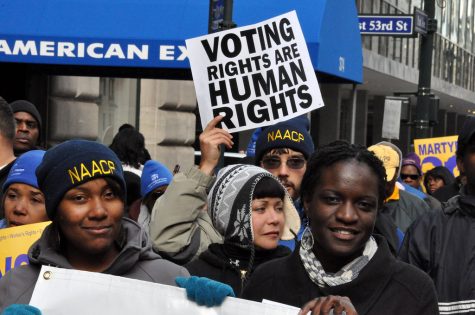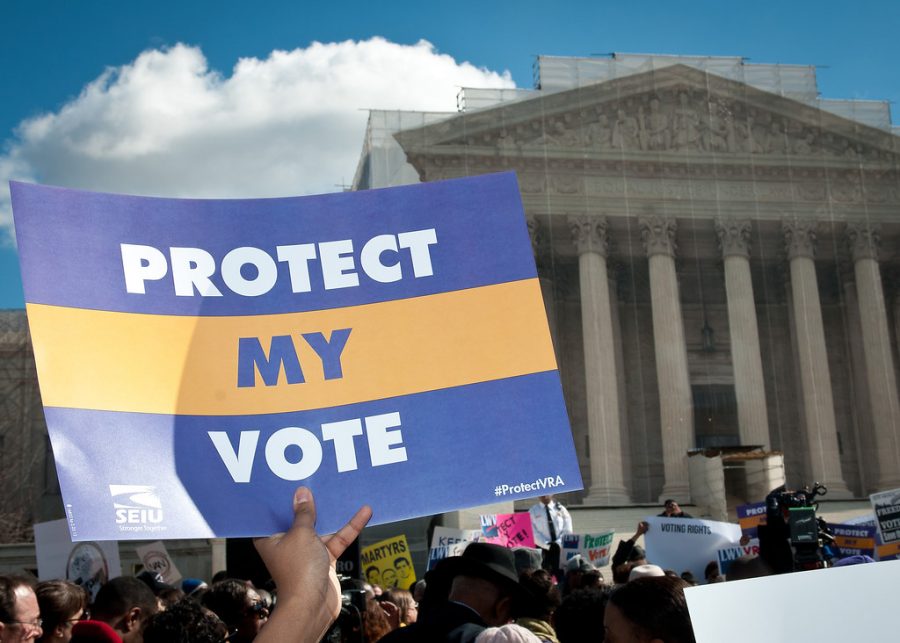Georgia gets out the gate first, as GOP controlled states race to suppress votes
On March 25, 2021, Georgia’s Republican governor, Brent Kemp, signed a bill that requires proof of identity for absentee voting, limits the practice of ballot boxes, and prohibits providing voters with food or water as they wait in line. These limitations affect lower-income, racially diverse, and young voters who tend to vote for the Democratic Party. The bill has received significant backlash for its similarity to Jim Crow laws and for upholding the long-standing voter suppression in Georgia.
Georgia has a lengthy history of voter suppression dating back to the post-civil war period, including the intimidation of black voters by KKK members and Jim Crow laws, which severely restricted voting for black people. The laws allowed for literacy tests, poll taxes, and residency requirements. More recently, Georgia has implemented voter suppression tactics, which are not a part of the new bill, such as closing polling stations in disproportionately black areas, forcing voters to wait for hours in line, and requiring “exact” signature matches. These methods have decreased voter turnout in Georgia for years, especially for people of color. Considering former President Trump’s attempts to overrule Georgia’s election results, these new regulations allow votes for democrats to be overturned in future elections.

The NAACP (National Association for the Advancement of Colored People), ACLU (American Civil Liberties Union), and other civil rights groups have sued Georgia to overturn the bill. The NAACP suit was filed on March 28, 2021, in the United States District Court for the Northern District of Georgia. It claims that Georgia Republicans violated the Constitution and the Voting Rights Act of 1965 when passing this legislation. The Voting Rights Act of 1965 banned the use of literacy tests and allowed the U.S. attorney general to investigate the use of poll taxes. Lawyers from the NAACP claim the law “is the culmination of a concerted effort to suppress the participation of Black voters and other voters of color by the Republican State Senate, State House, and Governor.” The suit also alleges that Georgia’s Secretary of State obtained records containing the racial demographics of voting and further used the paperwork while drafting this legislation. Additionally, the suit argues that Georgia legislators understood that this new bill would decrease the turnout of people of color.
42 other states are considering similar legislation, and Georgia Republicans argue that voting restrictions serve to dispute any claims of voter fraud after the 2020 election, even after election officials have expressed that there was no widespread voter fraud during the 2020 election. “There’s nothing wrong with securing a great system,” Florida State Senator Dennis Baxly said when new voter laws were proposed.








Felipe Gonzalez • Apr 13, 2021 at 10:07 am
In response to Academy Staff: Name one way that the new voter law is in any way ‘Jim Crow’ or ‘racist’.
Felipe Gonzalez • Apr 12, 2021 at 11:49 am
Ok, first thing: Georgia’s new bill has one main idea in it that is controversial, which is voter ID. This is the practice of verifying that someone is not posing as another person. to steal their vote, and it was a major problem in the last election with claims (specifically claims, none confirmed) that voter fraud was widespread and a main contributor to Joe Biden’s victory. While this is not proven, a lot of dead people, people who had moved to different places, etc. were not allowed to give their contribution and fulfill their constitutional obligation to vote for the candidate that they wanted, and in the case of dead voters, it is outright disrespectful to the deceased person’s family to steal their vote. Georgia’s new bill, however, was called “racist”, and “a new Jim Crow law”. This is outright racist. To think that African Americans and other minorities are too stupid to get their own ID to prove their identity is a racist notion, in it of itself. To me, a Hispanic male, this is extremely degrading. Do you really think that African Americans have gone their whole lives without a bank account, for which you need identification in the form of social security; do you think they never have drivers licenses, and therefore are driving illegally; do you really think that they never drink alcohol, as you need to prove you are above 21 to drink? And besides the racism, do you really want your ballot to be harvested by someone you don’t want to win, or to have someone who really isn’t intelligent enough to get an ID to vote for the future of our great country?
Academy Staff • Apr 13, 2021 at 6:55 am
Thanks for your reply, Felipe. A few thoughts. The main idea of the Georgia law is not voter idea. The main idea is actually to allow a partisan legislative body to alter the the outcome elections when they don’t like the result. You need a much bigger historical lens to understand how this law and others like it fight into a long history of denying the vote to African Americans, and other minorities. There are very good reasons why the Georgia law and and others like it are seen as an expression of a new version of Jim Crow. Here is one recent piece to get you started: https://www.washingtonpost.com/opinions/2021/04/12/only-congress-can-stop-jim-crows-return/?utm_campaign=wp_todays_headlines&utm_medium=email&utm_source=newsletter&wpisrc=nl_headlines&carta-url=https%3A%2F%2Fs2.washingtonpost.com%2Fcar-ln-tr%2F31d969f%2F60756ba79d2fda1dfb4d9be8%2F59bab9f39bbc0f706bb9bab5%2F34%2F65%2F60756ba79d2fda1dfb4d9be8